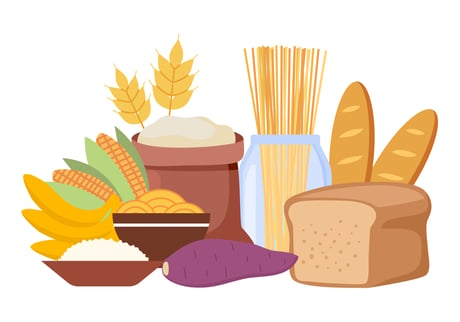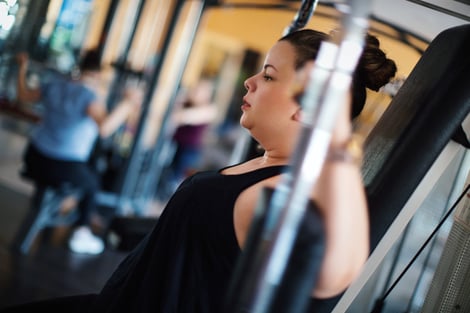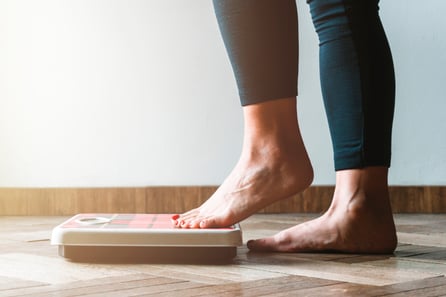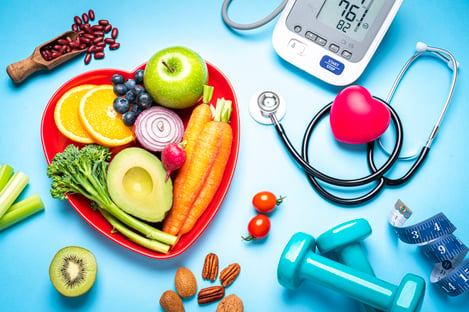The New England Journal of Medicine published a study of adults showing that the average holiday weight gain was .37 kilograms, or just under a pound, and more than half the people in the study stayed within a kilogram, or just over two pounds, of their other weigh-ins. Now that the holidays are over, you can lose that weight and stay healthy during the long colder months. Here are five healthy habits to get started with.
 1. Do make a plan to manage your stress level.
1. Do make a plan to manage your stress level.
A good place to start is finding ways to ease stress and anxiety when they occur, or even before. That may mean doing yoga or meditation, taking a hot bath or shower, listening to music, or even just calling a friend to catch up. Just 10 minutes of stress relief can help you feel more relaxed and make it less likely that you will turn to food. If you’re having trouble finding time to unwind, mark a daily 10-minute stress break on your calendar and tag it with an alert—then treat it like you would an important appointment and don’t miss it.
2. Don’t skip meals to “save up” for a big dinner.
Some people skip meals to “save up” calories for a big dinner or party, but this approach may backfire and lead to overeating later. Instead, limit your intake to an eight-hour window of time each day. This has been shown to be an effective weight-maintenance strategy. You can even try having a lighter breakfast and lunch at your usual times, making sure they incorporate a lot of vegetables and proteins with minimal carbs. For example, you might have a cup of Greek yogurt for breakfast, a green salad with grilled chicken and light dressing for lunch, and then let yourself enjoy the evening feast.
3. Do eat your foods in a specific order.
It helps to have a plate of salad or vegetables before anything else. These low-calorie and high-fiber foods will help you fill up before you dive into the higher-calorie options. Next, have some type of lean protein. If you are going to have carbs (such as potatoes, chips, rice, pasta, bread, or a sweet dessert), save them for the end of your meal. By then, you’ll be less hungry and the protein you’ve eaten will slow your digestion a bit, so you’ll feel full for longer afterward.
4. Don’t forget that beverages count.
An easy way to cut calories is to avoid drinks like regular soda, juice, coffee drinks with added sugar, and alcoholic beverages. Also, try to aim for six to eight glasses of water per day. If you do decide to drink alcohol, choose spirits mixed with something without added sugar, such as seltzer or diet tonic water, rather than beer, wine, or mixed drinks. Or stick to a drink that has only about 100 calories per serving. Do keep in mind that alcohol can lower inhibitions and make you more likely to indulge, so limit yourself to one or two drinks, and have a glass of water after each one.
5. Do give in to your cravings (somewhat).
Controlling diet and weight is a balancing act. Completely cutting out dessert and sweets is simply unrealistic. This can lead to binging or eating more than you’d like to. If you are really craving your favorite sweet, let yourself have some. Remind yourself that this won’t be your last dessert ever and try to put the fork down after one slice—or a few bites, if you’re satisfied by that.
Check back soon for the next 5 ideas (part 2) for how to stay healthy during these colder months.
This blog was written by David Behrmann, NIFS Health Fitness Instructor. To learn more about the NIFS bloggers, click here.


 You’ve probably heard the saying that “not all carbohydrates are bad,” but how do you differentiate between good and not-so-good for you? When it comes to carbohydrates, in order to identify which type is best, it’s important to first understand the
You’ve probably heard the saying that “not all carbohydrates are bad,” but how do you differentiate between good and not-so-good for you? When it comes to carbohydrates, in order to identify which type is best, it’s important to first understand the  While having a New Year’s Resolution to “lose more weight” isn’t a bad thing, it’s not easy. And depending on how much you want to lose and in what time frame, it’s not always realistic. To benefit your overall health without focusing on your weight, try setting (and sticking to) some of the following nutrition-related resolutions going into 2023.
While having a New Year’s Resolution to “lose more weight” isn’t a bad thing, it’s not easy. And depending on how much you want to lose and in what time frame, it’s not always realistic. To benefit your overall health without focusing on your weight, try setting (and sticking to) some of the following nutrition-related resolutions going into 2023. Science News (August 9, 2021) reported a study released by the University of Kentucky College of Medicine and College of Health Sciences that adds to the growing evidence that resistance training has unique benefits for fat loss.
Science News (August 9, 2021) reported a study released by the University of Kentucky College of Medicine and College of Health Sciences that adds to the growing evidence that resistance training has unique benefits for fat loss. 
 According to the
According to the 
 Did you know that cardiovascular disease is one of the leading causes of death?
Did you know that cardiovascular disease is one of the leading causes of death?  I am amazed at how many times I have heard and continue to hear people try to make a point by saying “they say,” as if just making that statement somehow makes whatever follows true. It would seem, based on how frequently people claim “they” say something, many of the advancements of human civilization somehow can be traced to the research done at the University of They. However, searching through
I am amazed at how many times I have heard and continue to hear people try to make a point by saying “they say,” as if just making that statement somehow makes whatever follows true. It would seem, based on how frequently people claim “they” say something, many of the advancements of human civilization somehow can be traced to the research done at the University of They. However, searching through  The traditional bodybuilding split of working one muscle group per day might work for the dedicated, high-level competitive bodybuilder who makes their living in the gym. But for the general population only looking to shed some unwanted pounds and improve their overall health, the traditional bodybuilding split is not ideal. Working multiple muscle groups in the same session is much more ideal because it ramps up the body’s metabolism more than working a single muscle group each day. To achieve this, we train the movement, not the muscles.
The traditional bodybuilding split of working one muscle group per day might work for the dedicated, high-level competitive bodybuilder who makes their living in the gym. But for the general population only looking to shed some unwanted pounds and improve their overall health, the traditional bodybuilding split is not ideal. Working multiple muscle groups in the same session is much more ideal because it ramps up the body’s metabolism more than working a single muscle group each day. To achieve this, we train the movement, not the muscles. Come on. We've all heard this before—from friends, from coworkers, and possibly from our own mouths. I swear, salads are easily the most famous “diet food.” Why is that? Do we really have to eat salads to lose weight, clean out our “pipes,” or be healthy? In this blog I break down each of these claims and then talk about ways to improve your veggie game!
Come on. We've all heard this before—from friends, from coworkers, and possibly from our own mouths. I swear, salads are easily the most famous “diet food.” Why is that? Do we really have to eat salads to lose weight, clean out our “pipes,” or be healthy? In this blog I break down each of these claims and then talk about ways to improve your veggie game!